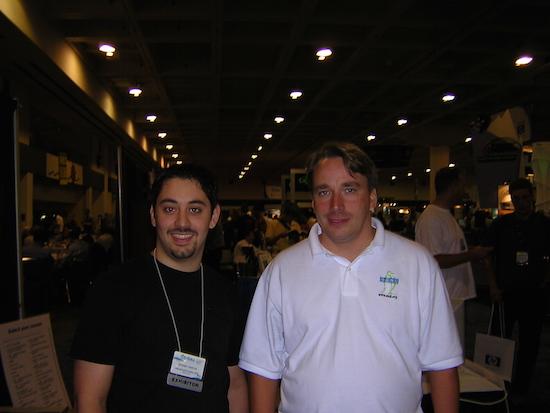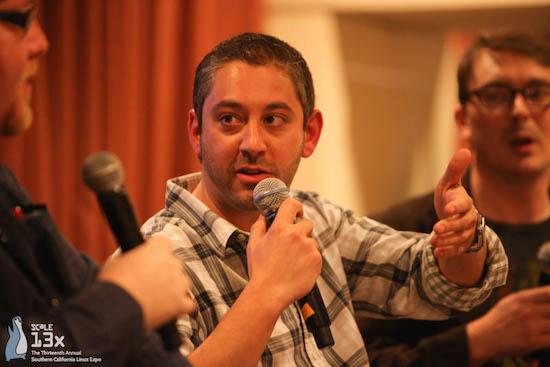LinuxQuestions.org: Not Your Average Linux Forum

For many of us, our introduction to computing is being placed in front of a machine where the only challenge is figuring out the Windows user experience paradigm. Getting started with Linux, on the other hand, requires a bit more effort, a fair amount of trial and error, and perhaps some colorful language along the way.
When I got started with Linux (Red Hat 9 specifically) back in 2003, the process was quite involved. Before beginning the installation process, I did significant research and took copious notes (by hand, as I recall) on hard drive repartitioning and configuration of master boot records. The sense of accomplishment that resulted the first time Red Hat booted successfully faded quickly as I realized that much still needed to be done: getting X working on my hardware, configuring audio drivers, getting dial-up networking to work and so on. For each issue, the process was the same. Working under Windows, use the Internet to research the process (and take notes) and download the necessary packages/patches. I then would reboot into Red Hat and attempt what I had researched. When I failed—and I did, many times—I would take careful notes about what I did and what the logs and error messages said. Then I would reboot into Windows and scour the Internet support forums for people having the same problem and repeat the process.
Thanks to the near-ubiquity of the Internet, this process now is much more streamlined. The plethora of really good and free virtualization platforms have eliminated the need to "risk" your primary computer to try something new and different. The willingness of hardware manufacturers to work with kernel developers has led to the major subsystems (audio, video, Wi-Fi and so on) just working in most cases.
The thing that hasn't changed, and probably never will, is the need to look to the community for support and guidance. Even the most comprehensive documentation can't possibly cover every scenario, and so it's through the sharing of our experiences (successes and failures) that we all learn.
Today, if you do a Google search for an error or issue installing or configuring Linux, the results you get will be full of support forum posts from other users who had the same problem and (hopefully) a solution. At least a couple of those links will point to posts at the various forums at LinuxQuestions.org. With more than a half-million registered users around the world and two-dozen forums covering a wide range of topics, LQ is one of the largest and most active user support sites around.
Earlier this year, LinuxQuestions.org celebrated its 15th anniversary, and to commemorate this milestone, I spent some time with its founder and maintainer, Jeremy Garcia.
Brian Conner: Tell me about yourself—where you're from, what you do for a living, hobbies and so on.
Jeremy Garcia: I'm from Buffalo, New York, and in addition to running The Questions Network (currently LinuxQuestions.org, AndroidQuestions.org and ChromeOSQuestions.org), I do consulting around both implementing open source and building sustainable communities. Outside the tech realm, I enjoy running, traveling, local history and am a bit of a foodie. I'm also a Bills and Sabres fan, which has proven challenging during the past decade.
BC: How did you get your start with computers and Linux (the obligatory "what was your first distro" question)? And, what is your current distro?
JG: Computers, programming and technology in general always have fascinated me. As for Linux specifically, while I was in high school, I started working for a local ISP that used UNIX almost exclusively. The "UNIX way" just clicked and made a lot of sense to me. It wasn't long before I wanted to run something similar at home. The ISP used SCO (fairly ironic in retrospect), so home use really wasn't an option for licensing and cost reasons. Searching for an alternative quickly lead me to Linux. I purchased The Linux Bible from a local bookstore, so my first distro was Yggdrasil. I've used Linux as my main OS ever since. I like to tinker and understand how things work, so the fact that I could get an operating system that allowed me not only to see how things worked, but also to modify how things worked, enthralled me. I moved to Slackware about a year later and have used Debian, Red Hat, SUSE, Fedora, Mandrake, Conectiva and a few others as my main distro through the years. I currently use Ubuntu on my desktop, but I have been considering alternatives.
BC: For those who don't know, what is LinuxQuestions.org?
JG: LQ is an on-line Linux community. The forum is the most well known aspect, but we have a wiki, tutorials, news and more. More than 30 distributions officially participate, so it has a little different vibe from some of the single distro fora. We focus on being friendly and welcoming to Linux newbies and veterans alike.
BC: What prompted you to start LQ?
JG: I had just gotten my first real Linux job, and I wanted to give something back to the community. I had been using Linux for a while at that point and wanted to offer help to existing and potential users. I figured someday the site would grow to maybe a few hundred people, so to say it has grown far beyond my initial expectations is a monumental understatement.
BC: Earlier this year, LQ celebrated its 15th anniversary. Surely you didn't expect it would become what it has. Do you remember what your expectations were at launch time?
JG: As I mentioned, when I started the site, my initial expectations were fairly modest. I really just wanted to give something back to a community that I felt had given me quite a bit. I put a ton of work into the site, but I did so because I enjoyed it, not because I expected any long-term gains. We got a chance to exhibit at LinuxWorld in New York a few years in, and the feedback we got was really energizing. We had mods fly in from multiple countries, and people from all over the world visited our booth to tell us how much they liked the site, explain how much it had benefited them or just stopped by to say hello because they wanted to meet us. It was a humbling experience, and one that has happened many times since. If you'd have told me when I founded the site that I'd have experiences such as that one, I'd certainly not have believed you.
BC: Relating to the last question, would you care to hazard a guess where LQ will be 15 years from now?
JG: Projecting that far out is extraordinarily difficult, especially when the Internet is involved. What I can say is that LQ will do everything it can to remain relevant while staying true to our ethos. We've built up a huge knowledge base through the years, and keeping that available to the community for posterity is important to me.
BC: Tell us about the hardware and software platform that LQ runs on currently and how it has evolved during the last 15 years.
JG: LQ started on a single dedicated Pentium Pro server co-located at the aforementioned ISP. It's had a couple iterations since, and we're actually working on an infrastructure refresh now. The site currently runs on bare-metal RHEL servers and uses nginx and MariaDB.
BC: In your estimation, what's the biggest achievement (or accomplishment) of LQ so far?
JG: That's a difficult question. I'm proud that we've remained friendly and true to our initial goals despite how much we've grown—that's a testament to our great mod team. I'm also proud of how many people we've helped through the years. I've heard from many members that they would have given up on Linux if it weren't for LQ. That's a testament to our great members.
BC: Surely there have been some low points along the way. Any particular occurrences that you were able to learn from as you moved forward?
JG: We've been lucky in this regard I think. When a fellow Linux forum went under, some in the LQ community felt the sudden influx of new members would impact our culture, but I think it made us stronger. We did have some DB corruption about ten years ago that looked grim, but we were able to recover with minimal data loss.
BC: Has the success of LQ opened any doors that wouldn't have been available to you otherwise (speaking at cons, meeting interesting people)?
JG: Absolutely. I've gotten to meet Linus and a variety of other open-source luminaries. I've gotten to speak at conferences, judge the LinuxWorld awards, be on a variety of panels, be on the board of Linux Fund, have my own magazine column—too much to list really. The Open Source world is full of smart, energetic, talented people. I'm absolutely a better person for having been exposed to it. I've also made quite a few good friends along the way.

Jeremy Garcia with Linus Torvalds at LinuxWorld in 2003
BC: Meeting Linus so early in the life of LQ, must have been a huge thrill. Did you get a chance to talk with him? Does he have an account at LQ (and does he use it)?
JG: Linus stopped by many of the booths in the .org pavilion, and we got to chat with him for a while, so it was definitely an experience. He mentioned that he was familiar with the site and had ended up there a few times after searching for solutions to non-kernel problems, although I don't think he has an account.
BC: With more than 500,000 registered users, LQ has to be one of the largest non-distro-specific Linux user support forums. Why do you think LQ has become so popular? Along those lines, the LQ community is one of the most positive and supportive I've experienced. Any thoughts on how you've managed to avoid the trolling and newb-bashing that seems to happen on other support forums?
JG: I think our success is very much due to the fact that we are friendly, positive and supporting. I explicitly set that welcoming tone very early on, as I knew the Linux community had a reputation among some for being rough on new users. The mods very much picked up on that and have kept that ethos alive during our growth. With that culture now ingrained, new members pick up on it and reciprocate.
BC: One of my favorite things about LQ, which I suspect often is overlooked, is the direct link to "Zero Reply Threads" in the right-side menu. I feel this is a great way for an experienced Linux user to jump in and help those users who are, perhaps, most in need. Do you keep an eye on the traffic to this page? And, has it had the desired effect? Also, I noted that the listing is limited to posts from the last 30 days. Was this time frame chosen for practical reasons or philosophical ones?
JG: I absolutely concur with your assessment; if you're an experienced Linux user and are looking for a challenge, that link is a great place to start. Answering "Zero Reply Threads" is something we actively promote, and we'll occasionally have dedicated Zero Reply Drives, which do measurably impact the number of threads that haven't received a response. Returning results from the last month seemed like a reasonable default, but you can arbitrarily change the duration.
BC: The landscape of Linux is in a perpetual state of change—new and changing distros, applications being forked, applications being abandoned—how is this constant flux reflected in the LQ community, if at all? And, does it provide any challenges to you and the maintainers of LQ?
JG: I don't think it presents us with any specific challenges. I think the ever-changing landscape of the Open Source world is one thing that keeps it fresh and interesting.
BC: Could you pull back the curtain a little bit on the annual LQ Members Choice Awards? Linux users as a group tend to be very loyal to their distro and preferred apps, so I imagine the voting and comments can get heated.
JG: With our large and varied member base, the MCA discussions certainly can get heated—especially when it comes to certain categories, such as desktop distro, text editor and a couple others. I started the annual polls on a bit of a whim, and it's been really interesting to watch them grow each year. It's also been rewarding to see how enthusiastic some of the past winners have been.
BC: In addition to LQ, you are one of the principles of the Bad Voltage podcast. Please tell us about Bad Voltage and how it came to be.
JG: Bad Voltage is a podcast that myself, Jono Bacon, Bryan Lunduke and Stuart Langridge have been doing for almost two years. Every two weeks, we deliver an amusing (sometimes NSFW) take on technology, Linux, open source, politics, music and anything else we think is interesting. I've been friends with Jono for many years after seeing him at one too many conferences and was introduced to Stuart through him. We tossed the idea around for a bit after a suggestion from Jono and agreed that Bryan complimented the team nicely. We recorded a pilot episode to see if the idea was worth exploring further, and all of us knew it had some potential right then. I think we've really hit our stride, and we recently performed our first live show at SCALE in Los Angeles. We have another live show coming up in Fulda, Germany. Check out https://badvoltage.org for more.

Jeremy Garcia on a Panel at SCALE 13x
BC: What's the best way for an experienced Linux user to get involved with LQ community? And, what is your advice to someone just getting started with Linux?
JG: We're always looking for experienced Linux users to help answer questions. There is a continual stream of new and interesting challenges to solve in the forum, so if you want to help the Linux community, I think LQ is a great place to do so. As for those wanting to get started with Linux, I'd say jump right in. Linux distributions have never been more approachable, and if you get stuck, you can always head over to LQ for help.
Resources
LinuxQuestions.org: https://www.linuxquestions.org
Jeremy's Blog: https://jeremy.linuxquestions.org
Zero Reply Threads: https://www.linuxquestions.org/questions/lqsearch.php?do=noreplies
Bad Voltage Podcast: https://www.badvoltage.org









